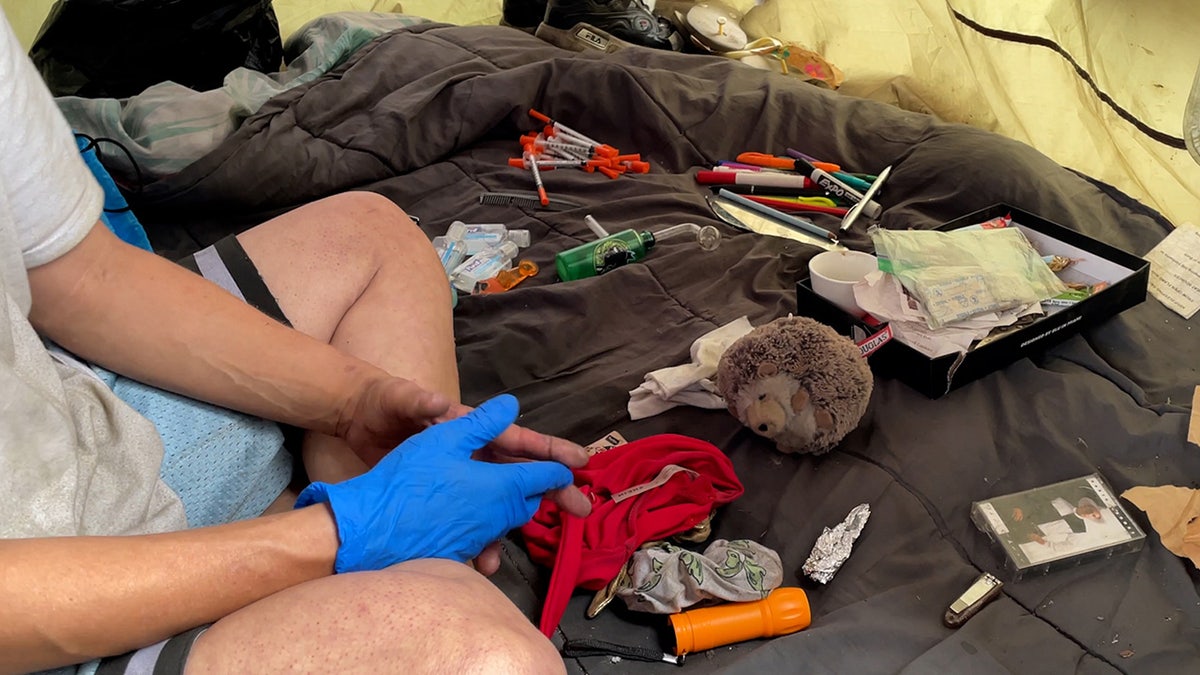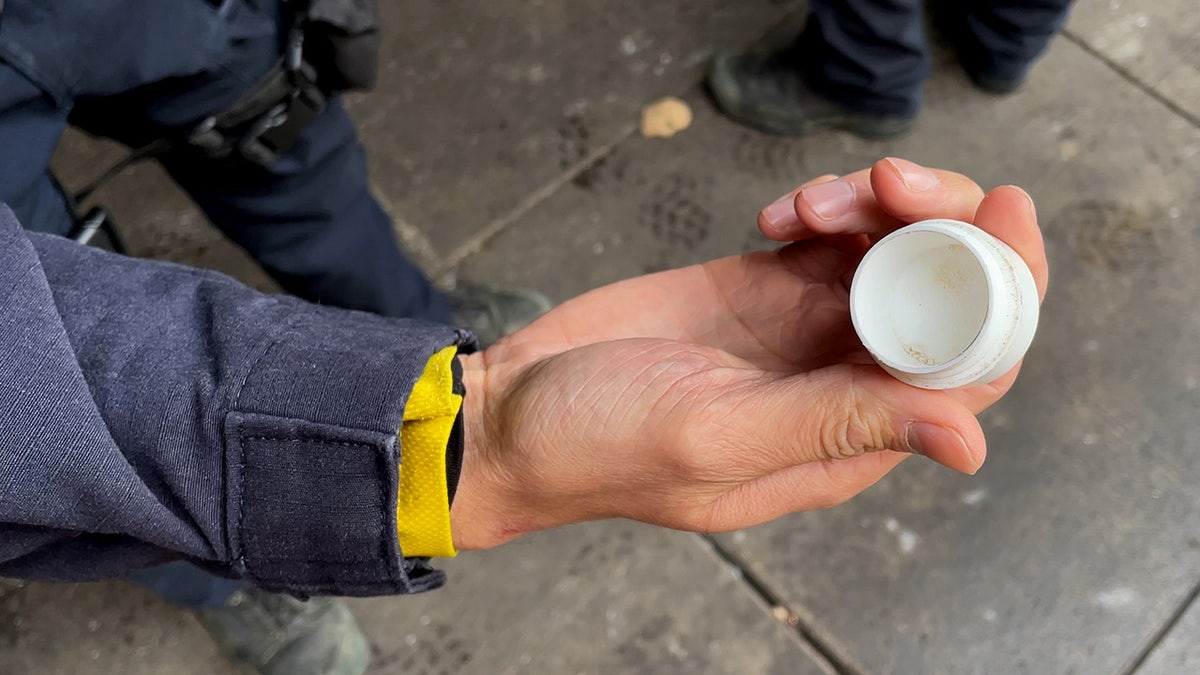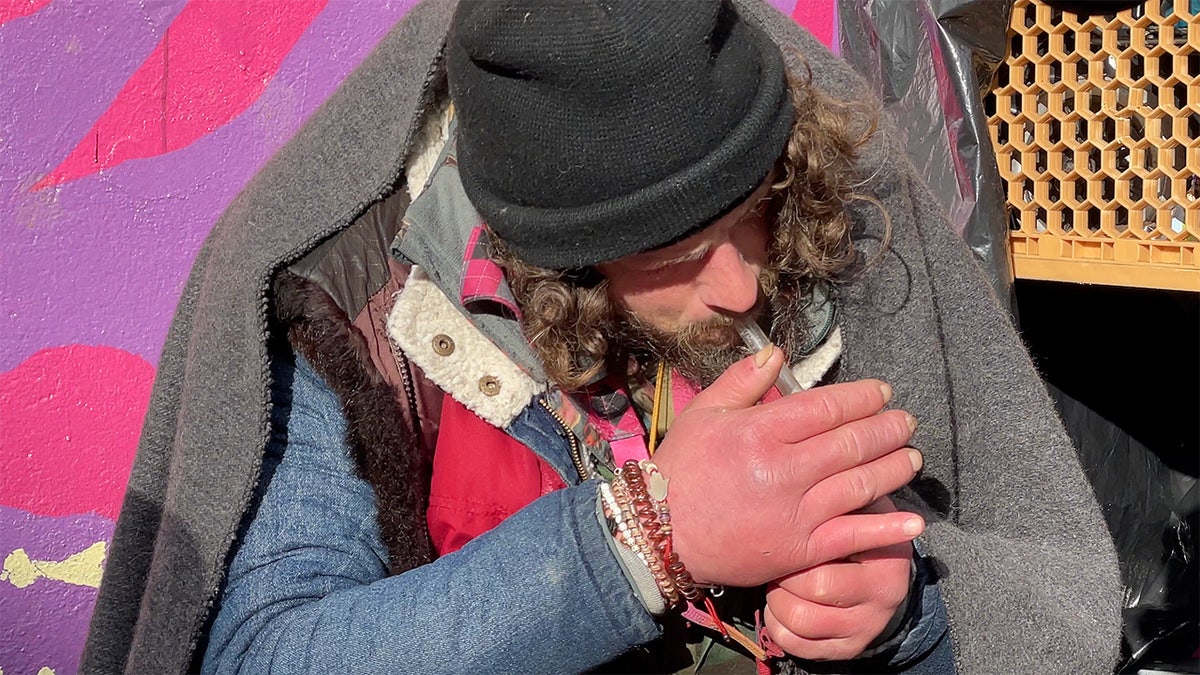‘Fentanyl nexus’: On the streets with Portland police’s bike squad
As Portland reckons with an "explosion" of open-air drug use, Fox News rode along with the police bureau's bike squad. Here's what we saw in the City of Roses.
Oregon Democrats unveiled their plan to roll back the state's pioneering drug decriminalization law in response to rampant public drug use and rising overdose deaths, immediately drawing criticism from both Republicans and pro-decriminalization advocacy groups.
"We need to urgently expand drug treatment and addiction prevention in our state while stopping drug dealers, confiscating hard drugs, and cleaning up trash and graffiti," Senate Majority Leader Kate Lieber said. "We won't solve this problem overnight, but this plan will get people the help they need, clean up our communities, and save lives."

Needles, foil and other drug paraphernalia filled a woman's tent in downtown Portland in July 2023. Lawmakers in Oregon are considering re-criminalizing drug possession three years after the state's first-in-the-nation decriminalization law took effect. (Hannah Ray Lambert/Fox News Digital)
Lawmakers on the Joint Committee on Addiction and Community Safety Response propose making drug possession a Class C misdemeanor, reversing the key part of Measure 110, the first-in-the-nation decriminalization law passed by 58% of voters in 2020.
The plan includes higher sentences for drug dealing in certain locations, like near parks or homeless shelters. It would also make it easier for people to get treatment, housing and insurance.
Partnership for Safety and Justice Executive Director Andy Ko criticized the Democrats' plan for re-instituting criminal penalties.
"Treating the tens-of-thousands of Oregonians suffering from addiction as criminals is pointless, irresponsible, and profoundly wasteful," he said in a statement. "Regressive policies of the past half-century too often elevated punishment as if it were health care."
Republicans, who introduced similar legislation earlier this month, don't think the proposal is tough enough.
A Class C misdemeanor is the lowest crime classification, punishable by up to 30 days in jail, a $1,250 fine, or both. The Democratic proposal also allows people to avoid charges if they complete a behavioral health screening and meet with a caseworker.

A police officer holds a container with a small amount of suspected fentanyl powder on Jan. 11, 2024, in Portland, Oregon. (Hannah Ray Lambert/Fox News Digital)
‘FENTANYL NEXUS’: PORTLAND POLICE’S BIKE SQUAD FACES ‘EXPLOSION’ OF OPEN-AIR DRUG USE
"Anything short of reclassifying deadly drugs as a Class A misdemeanor crime will be inadequate to effectively steer more people into more treatment more quickly," the Coalition to Fix & Improve Measure 110 said in a statement. The coalition of political and business leaders in Oregon lobbied the legislature to reform Measure 110 and promises to send a ballot measure to the voters if lawmakers don't take action.
The Republican bill would make possession of drugs like fentanyl, heroin and meth a Class A misdemeanor and would require treatment to avoid jail. If convicted, drug users could face up to a year in jail, a $6,250 fine, or both.
Lawmakers will meet for a special legislative session beginning Feb. 5 that is expected to last no more than 35 days.
Measure 110 decriminalized small amounts of all drugs. Police can cite people for possession with a $100 ticket, which drug users can waive by calling a hotline for service. But almost no one calls the hotline or pays the fine, and open-air drug use has surged in some areas.
Addiction rates and overdose deaths have skyrocketed in Oregon and nationwide as fentanyl swept across the country. Numerous polls show Oregonians favor re-criminalizing hard drugs and making treatment required, not voluntary, as a jail alternative.
"The only reason that the current power structure and the political power class in Oregon is even dealing with this right now is because they can read the polls," Clackamas County Commissioner Ben West told Fox News on Monday.
West doesn't think the Democrats proposal goes far enough, agreeing that a Class A misdemeanor would have more teeth.
"Stop pandering to special interest groups," he said. "Stop worrying about the next election and worry about the bodies we're stepping over in our cities."

A man smokes meth on the sidewalk in Portland, Oregon, on Jan. 10, 2024. (Hannah Ray Lambert/Fox News Digital)
CLICK HERE TO GET THE FOX NEWS APP
In Portland, where the effects of Oregon's drug laws are most stark, city officials have been urging the state to act.
"We need to give tools to our first responders so they can take action," City Commissioner Dan Ryan previously told Fox News. "If someone is smoking fentanyl in public and it's causing harm to those who are trying to access the sidewalk, then the police need to be able to respond to that … It's just common sense."
Portland's City Council unanimously passed an ordinance banning public drug use in September. But city officials said the law couldn't go into effect until state lawmakers pass legislation allowing them to enforce it.





















